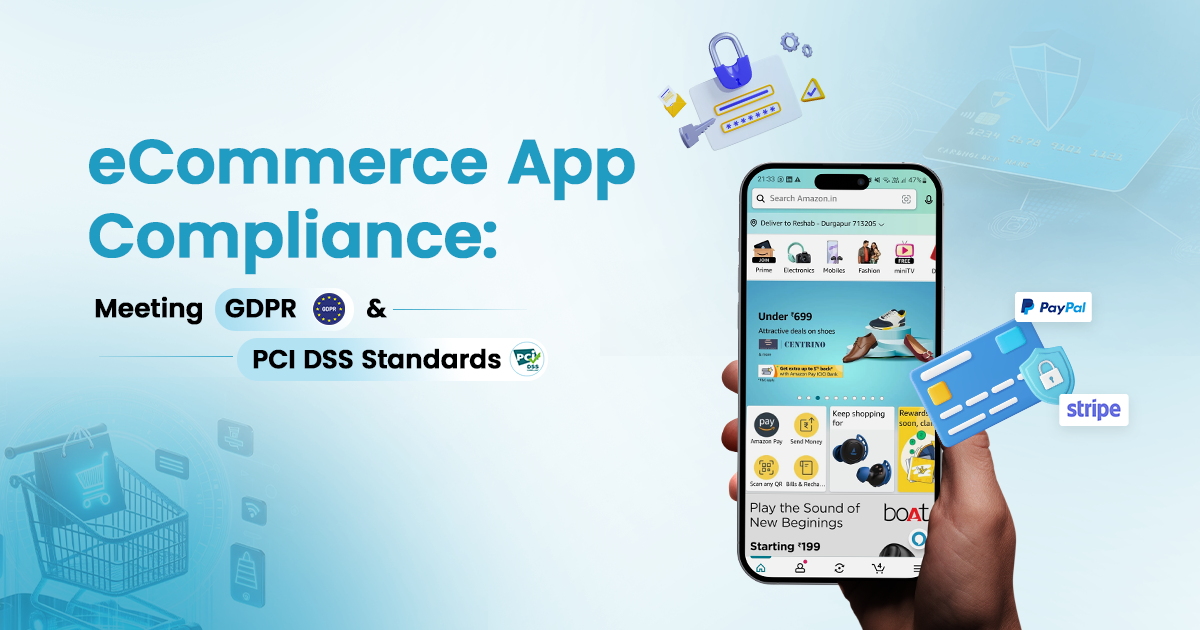Every time a user enters their card details or even their address, they are actually putting trust in your hands. With the increase in eCommerce applications, the trust becomes fragile. As per the IBM report, it has been estimated that the cost of data breaches in 2024 was 4.88 million, an increase of 10% from the past year.
So, businesses that fail to follow PCI DSS compliance have rising penalties; for example, noncompliance fees can range from $5,000 to $10,000 per month and can even increase to $100,000 or more. On the contrary, on the privacy side, GDPR brought a larger amount of fines, like billions of euros, since 2018. As per the CMS report, it has been observed that in the industry and e-commerce, the fines have reached around 897 million euros, driven by violations like processing data or the ones that fail to meet the transparency standards.
If your eCommerce app isn’t ready with standard compliance, a single breach can cost you more expenses and much damage, affecting the business growth. In this comprehensive blog, you will get a clear picture of how any kind of e-commerce app is launching or scaling up and also becoming compliant with GDPR & PCI DSS standards with actionable steps.
Let’s see how you can make your eCommerce App compliant with these popular standards.
What Are the Steps to Build GDPR & PCI DSS Compliant E-Commerce?
The significant phases to build GDPR- and PCI DSS standard-compliant ecommerce applications are as follows:
Phase 1: Understanding Data
Firstly, it is very important to know what type of data your app actually handles. Then you have to map out the user information in a database, starting from the registration to checkout to storage, and all such things. There are also some separate sections, like personal information and payment information. Additionally, you have to decide early whether you want your app to process payments directly or use a trusted third-party service.
Phase 2: Privacy & User Control
With a clear picture of your data, it also needs to have proper privacy, which seems to be an integral part of your app. There are three main things that you have to focus on while building your e-commerce app with such standard compliance. First of all, you have to collect data that is needed only in the app for usage, and you also need to maintain transparency for data sharing. And users must have proper control and great accessibility regarding their personal data.
You should implement security practices that are able to protect all data at any point and also help in securing the connections and safeguarding the data that is necessary for establishing your own e-commerce application. It is also important to notify the authorities about any issues when it is under GDPR compliance.
Phase 3: Payment Data & Security
So payment data is quite sensitive, and protecting it is very important. Whether you are dealing with card information or outsourcing processing, the goal is to prevent any kind of unauthorized accessibility or any kind of breaches. Incorporating PCI DSS compliance ensures proper security, and this helps to reduce risk, keeping the transactions secured. Implementation of security and compliance effectively often begins with foundational decisions, such as choosing a software development methodology for your systems.
Phase 4: Unified Data Protection
As GDPR and PCI DSS compliance standards focus on different types of data, their functions overlap, offering protection. You should align the approaches and make the compliance standard. By aligning with the approaches, there is much easier compliance, and it also empowers overall security. In this phase, you get to integrate encryption that mainly protects personal & payment information and also involves incident response plans that cover breaches & incidents.
Phase 5: Review and Improvement
So, standard compliance is not like one project; it’s a continuous process that stays. With that, regularly revising policies, monitoring the system security, and also auditing third-party vendors make the process of building much more successful. Also, you should encourage teams to stay updated on security as per PCI DSS and GDPR standards. With the continuous attention towards security, you can ensure that the app is safe, the user stays connected with confidence, and also grows sustainably.
Phase 6: Quality Assurance
Turning the compliance into trust is very important in the ecommerce app-building process. The compliance is about how consistent and reliable the quality of your e-commerce app is in handling the data.
Regular auditing, testing, and user feedback are some of the processes that actually help you to confirm that the privacy and security standards are maintained. With the aspect of strong compliance that is backed up by quality assurance, safety turns into a trusted one that can set your ecommerce app apart from others.
Significance of GDPR & PCI DSS Compliance in Your E-Commerce Business
So, the standard compliance is not just about the avoidance of fines but also a growth strategy that impacts the e-commerce business. In today’s competitive market, users are more concerned about their privacy than the functionality of the app. Data protection as per the compliance standards is quite seriously taken by brands, and with e-commerce apps that comply with the GDPR & PCI DSS, there is better security & transparency.
Compliance standards open new doors in the global market in the space of the e-commerce industry. While meeting the standards can help you build trust with the users under GDPR, and also offers payment protection under the PCI DSS standard. This results in seamless partnerships, faster approvals, and more conversions for the users.
Conclusion
The data privacy and security concerns are no longer optional but are the fundamentals of trust. With a standard-compliant e-commerce app, there is no need to meet the legal standards, but it also builds trust in the users with trust. Collaborating with an experienced eCommerce app development service can help your app follow the GDPR and PCI DSS standards, making security the top priority. As a result, this makes customers shop with more trust and have a trustworthy shopping experience.




